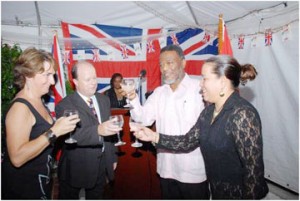-notes security reform won’t be overnight
British High Commissioner Fraser Wheeler says Guyana is well placed to take advantage of powerful, current global trends in such areas as food security, climate change, proximity to Brazil as a rapidly emerging economy, and 24/7 rapid global communication.
The British High Commissioner was speaking on Thursday at Queen Elizabeth 11’s birthday party reception at his residence, and among the guests were Prime Minister Samuel Hinds performing the functions of President, government ministers, members of parliament and the diplomatic corps.
 Noting that climate change is one issue at the top of the international agenda, Wheeler said that the British government is working closely with the government here to look at ways to realize President Bharrat Jagdeo’s vision of innovative use of the forest to help mitigate climate change and link it to development.
Noting that climate change is one issue at the top of the international agenda, Wheeler said that the British government is working closely with the government here to look at ways to realize President Bharrat Jagdeo’s vision of innovative use of the forest to help mitigate climate change and link it to development.
The High Commissioner also noted that in terms of food security which is a current pre-occupation globally, Guyana has clear agricultural potential with exciting possibilities. In continuing British support for agricultural diversification here, he said, Agriculture Minister Robert Persaud and a team will be going to the UK next month to explore investment opportunities.
Proximity to Brazil
Another powerful global trend, Wheeler said, is the rapid growth of the emerging economies and Guyana’s proximity to Brazil is an obvious economic advantage, particularly when the export of goods from the rapidly growing north-east Brazil through Guyana would cut four days shipping time off current times to Europe and North America.
The British diplomat also pointed out that 24/7 rapid global communication is something that is almost taken for granted but Guyana again is well placed to take advantage as the only English-speaking part of South America and in the right time zone for the Eastern US to attract investment in call centres. A visit here by British-funded management/ consultants recently confirmed the opportunity, Wheeler added.
Looking at energy security, another global focus today, he acknowledged that Guyana is highly dependent on oil imports and therefore vulnerable in the medium-term, but maintained there is clear potential here in hydro-electric power, bio-fuel production, and off-shore oil and gas resources.
Wheeler also referred to the global concern over the increasing international threat of organised crime, and noting Guyana’s high vulnerability he said the fully fledged security sector reform which is getting British financial and technical support would create the capacity to tackle the threat and allow real development.
He said further that President Jagdeo was well aware of these opportunities, and the British will be giving their support to package them together to develop a coherent proposition for large-scale investment. “In effect,” Wheeler asserted, “Guyana has reached a watershed (and) like most watersheds, it will not necessarily be easy to navigate (as) current trends in the global economy are clearly a cause for concern.”
Meanwhile, Wheeler observed that the British government was spending money in Guyana through a number of multilateral programmes, particularly the European Commission on the modernisation of the sugar industry and sea defences through bilateral and regional development programmes and through debt relief.
Security sector reform
Speaking about support for comprehensive security sector reform, Wheeler said that there is a shared understanding between the two governments that nothing less would address the chronic crime and security challenges facing Guyana.
This process is now underway, he said, and it is reflected in the signing of an interim MOU in August last year. Both governments have agreed on an action plan, and have implemented some immediate steps, involving parliamentary actions, including setting up committees, including commitment to a permanent standing committee on security.
The British High Commissioner also expressed the hope that both governments will be in a position to sign a full MOU on security sector reform “which will allow us to tap into the £4 million of new money that the British government has made available for the purpose and linked to that, we will continue to support the government to build what I believe can in effect be a new model of sustainable development, based on linking real commercial opportunity to current global trends.”
However, Wheeler cautioned that Security Sector Reform is not something that can be done overnight and it will take time and commitment from all sides and resources.
He also pointed to the focus over the past year on sustainable development with British support for the implementation of the National Competitive-ness Strategy, on which progress is now beginning to be made.
In that context, he said, the British have supported the diversification of agriculture through the introduction of British livestock genetics, particularly in relation to sheep; the supply of super male tilapia for the growing aquaculture sector; and VSO expertise in organic farming.
He also referred to British assistance in the water and education sectors, besides support for sustainable forest management and eco-tourism.
Moreover, Wheeler said, DFID (UK Department for International Development) will shortly launch its new development strategy for the region with the aim of tackling risks such as climate change and insecurity and creating opportunities for economic growth.
“We will provide aid for trade to help ensure that the Economic Partnership Agreement between the Caribbean and Europe is the major success it has the potential to be,” the British diplomat added.

